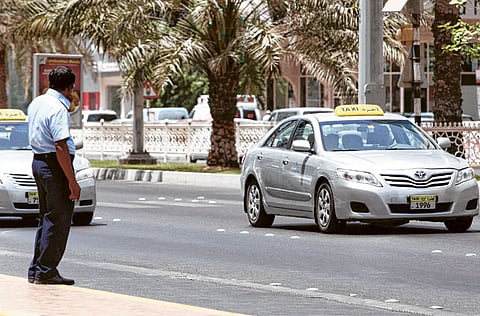Dh12 is new minimum fare for Abu Dhabi taxi
Commuters looks for alternatives as cabs get more expensive in capital

Abu Dhabi: With the announcement of plans to increase taxi tariff and introduce a new minimum fare of Dh12 per trip, the capital’s regular taxi users have begun to look for other modes of transport.
“I already spend about 10 per cent of my salary on taxi fares, now I will have to spend more and I can’t afford it,” said Duangporn Saenthaweesuk, a Thai national who earns a salary of about Dh8,000.
“I have to start looking for another option,” she told Gulf News.
The Abu Dhabi Integrated Transport Centre announced its plans to revise taxi fares in the capital on Monday as part of an effort to enhance the quality of its services.
The revised rates, which will come into effect in a month, will see a minimum Dh12 (about $3.25) fare for all trips.
While there was a starting fee of about Dh4 (rate varied between day and night) for taxis, there was no minimum trip fare in Abu Dhabi.
The new flag-down rate will increase from Dh3.5 to Dh5 for day trips, between 6am and 10pm, and from Dh4 to Dh5.5 at all other times. Trips will cost Dh1.82 per kilometre for both day and night trips, an increase from Dh1.60 and 1.69.
Taxi booking fees will also increase from Dh3 during the day to Dh4 and from Dh4 to Dh5 in the evening. The waiting time charge per minute will remain at 50 fils for both day and night trips.
Mohammad Darwish Al Qamzi, general manager, Abu Dhabi Integrated Transport Centre, said in a statement, “Despite the hike, taxi fare in Abu Dhabi emirate remains the lowest when compared to top cosmopolitan cities.”
He stressed the importance of pursuing improvements of practices and standards of the taxi sector to bring them to par with the world’s best.
Tariff revision
“The revision of the tariff of taxis operating in Abu Dhabi emirate, which has been approved by the Abu Dhabi Executive Council, is part of the efforts to enhance the quality of service provided to taxi riders,” Al Qamzi said. “It also supports the technological advancement witnessed by the transport sector in the emirate and contributes to providing services capable of enhancing the satisfaction of taxicab users.”
Regular taxi users Gulf News spoke to said the move will force them to cut back their taxi usage and look for alternative options.
While some understood the need to increase prices due to the high quality and safety of the service, they did not agree with the introduction of the Dh12 minimum fare.
“The Dh5 starting fee is fine, but Dh12 as minimum fare for a trip is too much. Living in Abu Dhabi is already expensive,” said Charlie, a 26-year-old Filipino expat, who works as a receptionist and earns a salary of Dh2,000,
“I have to try and use the bus more often, but the bus takes much longer so I will have to allocate more time to get to work,” he added.
“I use taxis every day to get to my office and I pay about Dh6 per trip, now I will have to pay double. This is not fair,” said Sameh, a Palestinian resident who does not own a car.
“I travel to Yas Island a lot for my work and it usually costs me about Dh60 now it will cost me about Dh100,” said the mother of one.
“The problem is our only other option is the bus, which is slow. I wish at least we had the option to use a metro, it would be much faster,” she added.
Sindu Sanjay, a 37-year-old Indian expat who has been living in Abu Dhabi for 17 years said that the hike is an additional cost in times when salaries are not going up.
“I feel the taxi fares will still be cheaper than other emirates but living in Abu Dhabi is more expensive than the other areas,” she added.
“This is not good. We only have one car so we send our daughter to her daily after-school activities in a taxi, because it is very safe and costs about Dh6 each way,” said Amel, a Sudanese mother of two.
“We can’t spend Dh12 each way, it will be double what we spend on her now. I don’t know what we will do, maybe I have to take my husband’s car and he has to start taking the bus,” she added.
Thea, a Filipino expat who earns Dh1,500 and lives in Mussafah, said she and her friends will really struggle to afford the new taxi fares.
“We use taxis on our days off because the public bus from Mussafah takes too long and many times it is full. But now we have no choice, we have to use the bus, somehow,” she said.



